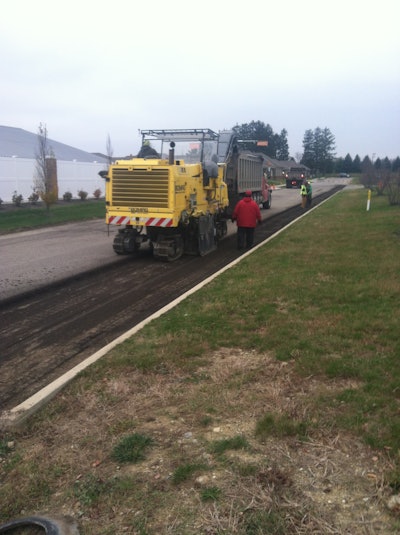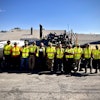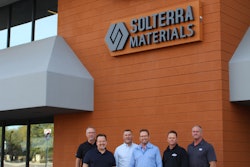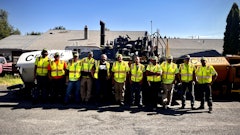
Many contractors begin life the same way as Pavement’s 2015 Contractor of the Year B & C Blacktop, Columbus, OH. But few pursue growth so diligently and fewer still manage to reach $8 million in sales before their 20th business anniversary.
President and founder Bryan Myers has fearlessly developed his one-time driveway sealcoating business into a respected broad-based paving and pavement maintenance firm that counts commercial, residential and government agencies among its customers.
“Positivity is a big part of my game plan. I never have and never will plan for failure,” Myers says. “That’s something that separates me from a lot of people who stay the same size and don’t grow. I’m not afraid to fail. If I fail, I fail. I believe in ‘go big or go home’.”
In 2014 the 46-person firm generated 50% of work from commercial properties, 40% from residential work and 10% from government work; 80% of revenue is from paving (including dirt and stone work) with the remaining 20% split evenly between sealcoating and concrete. B & C Blacktop runs one concrete crew, two prep crews, and infrared crew, a sealcoating crew and two paving crews. The contractor was bonded in 2006 for only $250,000 but now is bonded up to $2 million.
“I believe that Field of Dreams saying, ‘If you build it they will come,” Myers says. “We always figured that if we felt there was a need for something, and if we put ourselves in a position to handle it and to do it right, then the work would come to us. And that’s what happened.”
DEBT CAN DRIVE GROWTH
Myers says almost all of growth was equipment driven, a risk many contractors aren’t willing to take. “People are afraid to take on debt,” he says. “We wouldn’t be where we are if we were afraid of debt.”
B & C added infrared to support its sealcoating business, then added a small paver to do patching in 2002, another paver in 2003 and a LeeBoy 8500 in 2005. In 2009 a local paving company in business since 1972 approached Myers to buy them out. “So despite the fact we were on our way into a recession I bought their book of phone numbers, the website and the company name and brought his secretary along too with 12 years with the company. She had a relationship with those customers,” Myers says. “It was a good deal and I was able to expand my customer base instantly at a time when most contractors were struggling to keep their old customers.”
Myers says B & C Blacktop reached $4 million in sales in 2010, $6 million in 2012 and $8 million last year. He says it’s important to realize that when a company adds a service and makes a jump in gross sales that increase is not always reflected immediately in the net profit. He says that when B & C jumped from $4 million to $6 million in sales he didn’t make much more money than he had at $4 million. “But the second year I did make it up.” He says the 2014 gross is “up a ton but the net doesn’t reflect that gain.” But he expects to notice an impact in 2015 bottom-line numbers.
“It just takes a while to absorb that much more work and you have to know that you will work it out in the end and that it will benefit you,” he says. “It takes a while for the crews and company to become fluid doing that much more work.”
But Myers says B & C doesn’t take on any debt or bring any services in-house without analyzing the service and the numbers.
“When I look in my books at the end of the year and see we’ve been paying a subcontractor X dollars for a type of service, I think maybe it’s time to bring that service in house,” Myers says. “I take a look at what we need to bring it in house -- what additional equipment we need, any trucks, what additional employees do we need and what kind of training is involved, do we have someone already on staff that can do that work and teach others how to do it? After I consider all that I compare that cost to what we’ve paid to a sub and if I can justify it we bring that service in house.”
WHY ADD A MILL?
A good example is B & C Blacktop’s 2012 acquisition of a Bomag milling machine, “the most expensive piece of equipment I’ve ever bought.”
“My decision to move forward buying a mill came when I got to the point where I was subcontracting out so much work it was affecting our schedule,” Myers says. “Columbus is an older city and pavements were starting to reach the end of their life. We could rehabilitate them by milling so we spent an obscene amount of money with milling subcontractors. And at the end of the year we saw how much we’d spent and we asked how much would it cost us to do that work ourselves? We determined that if we used the mill ourselves just 25 days a year – 250 hours – it would pay for itself.”
Myers bought the mill at National Pavement Expo and used it 750 hours the first year and almost 1200 hours in 2014. “The scheduling has gotten easier now that we have our own milling machine,” he says.
Myers says that it’s important to remember that each piece of equipment requires additional support equipment that must be factored in. He says the first year they had the mill, for example, they hired a trucker to haul it on a trailer to and from the jobsites. Eventually B & C bought a trailer and their own truck to haul it. Plus, milling requires a water tank and initially they thought they could share the water tank they had. But because that tank was also needed for their stone work and sealcoating they bought additional water tanks.
Another example is the highway paver B & C Blacktop added last year. Myers says he looked at his schedule and realized he had more days of work ahead than he had working days, so he knew he needed to find a way to increase production. “What we needed was a faster paver, so we bought a Dynapac highway paver which really helped us speed up some mill-and-fill jobs,” he says.
And because they have the highway paver they will start bidding city street work this year. “There’s a learning curve with a highway class paver but once the crew’s learned it that will increase production even more.
“A company that’s not growing is dying. You don’t have to grow a lot but you have to grow a little all the time,” Myers says. “I’m going to make things work, that’s just how I am and how I approach the company. I understand there will be a learning curve and we might not make any money at it at first but it’s going to work.”
[possible captions]
“We try and find clients who are property managers and builders who aren’t just one-time clients,” he says. “We look for people who will have us do 10 or 12 properties each year and then we can count on that and we work to fill in around them.”
“We knew if we were going to grow like we planned and if we are going to support all the equipment we have we need to be diversified as far as our clients go,” Myers says.
“One of the reasons people don’t grow and don’t become stronger is they’re afraid to fail,” Myers says.
Bryan Myers says his attitude spills over to his estimators. “They’re better sellers. They are more confident and they come across better to our customers because of the way we do things.”



















